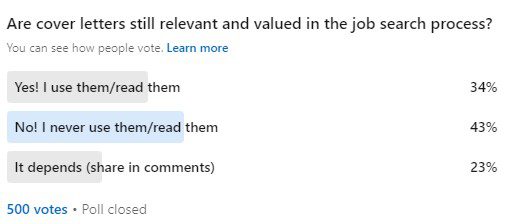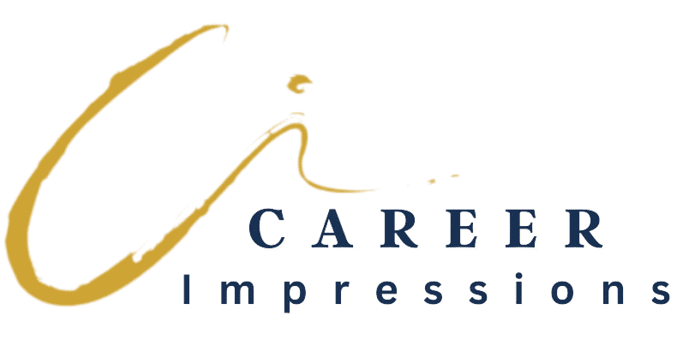
Are Cover Letters Still Relevant and Valued?
The necessity of cover letters is still hotly debated. While some companies explicitly require them, others consider them optional or unnecessary. This polarization can leave job seekers confused. Are cover letters valued? Do employers read them? Are they worth the effort?
After scouring the internet for answers on the relevancy of cover letters in today’s job search process – and not finding any conclusive answers – I posted the question to LinkedIn along with a poll. The results were not surprising…and pretty evenly divided.

With 500 votes, respondents seemed just as torn on the topic, with ‘no, I never use cover letters / read them‘ coming in ahead and “yes, I use cover letters / read them‘ a close second.
As a job seeker, should you write a cover letter or skip it? Is this file worth the effort, and what are the downsides of not including one?
Some comments in my poll post are enlightening and break down the questions above with good food for thought, so I encourage you to read them.
But to help, let’s break down some of the pros and cons of writing and including a cover letter with your job applications.
Cover Letter PROS
People agree that the most effective cover letters are well-written, thoughtful, and personalized. Writing a letter that meets these criteria can provide several key benefits to set you apart from other candidates.
First, a thoughtful cover letter (not a generic, run-of-the-mill letter) can help introduce you more personally, enabling you to say that you are interested in the position and the company. A great cover letter also provides a strategic platform to underscore specific competencies and experiences that align closely with the job description, demonstrating your suitability for the position beyond what your resume might convey.
Finally, a well-written cover letter allows you to address any unique aspects of your career trajectory, such as employment gaps or a transition between industries, which may not be readily apparent from your resume. You can use the cover letter to help the reader connect the dots and answer critical questions. Virginia Franco, executive resume writer, shares, “I’m a huge advocate of a cover letter when there’s a need for the job seeker to explain an “elephant in the room.” Worst case? It doesn’t get read. Best case? It makes a difference!”
Ultimately, by tailoring your cover letter to each application, you demonstrate a more genuine interest in the role, which could enhance your chances of landing an interview – if the letter is read.
Cover Letter CONS
While writing and submitting a cover letter can offer advantages, it also presents certain drawbacks. One significant downside is the time and effort required to craft a tailored cover letter for each job application. This process can be particularly burdensome if you are applying to multiple positions simultaneously. Researching each company and aligning your letter with the specific job can be time-consuming, potentially slowing down your application process.
Additionally, there is no guarantee hiring managers will read a cover letter. If it is not carefully crafted or lacks personalization (hello, I’m looking at you AI-generated generic letters), it could detract from your application rather than enhance it. A poorly written or unnecessary cover letter might even weaken an otherwise strong resume/application.
Executive-Level Cover Letters
Executive-level cover letters need a specific strategy. They must highlight the impact on organizational success through quantifiable results such as revenue growth or operational improvements while also emphasizing strategic leadership, the ability to think beyond the immediate role, and the contribution to a company’s overall vision. These high-level letters must convey executive presence and polished communication skills, demonstrating one’s ability to effectively influence top-level stakeholders and articulate complex ideas.
An excellent executive cover letter showcases how your leadership style aligns with a company’s goals and how you can contribute to its future success. Again, personalization and addressing the target organization’s pain points are critical.
Executive search firms typically do not prioritize cover letters as much as they do a candidate’s resume, professional reputation, and track record of success. While some may request a cover letter, many focus on evaluating a candidate’s leadership experience, industry expertise, and overall fit for the executive role through direct interviews, networking, and assessments. However, a cover letter can still be a valuable tool when requested.
According to BlueSteps, cover letters should be short and concise, providing specific information about the candidate’s qualifications, skill alignment, reasons for interest in the role, and relevant context, such as a referral or reason for career transition.
Final Thoughts
After weighing the pros and cons, most job seekers may still wonder: “Are cover letters worth the effort and valued?” The answer is you never know for sure. If an application requests a letter, the chances are higher that the hiring personnel will expect it and review it – so definitely include one! Otherwise, getting eyes on this letter may be hit or miss. Not knowing means there is a chance the letter you work so hard to create could be for naught, but why risk it?! Anything that can give you an edge is worth exploring during a job search.
Ed Han, a recruiter, says it best: “The job seeker has no way of knowing whether a given hiring manager does/doesn’t care. Thus, as with Pascal’s Wager, it’s better to send it and face possible irrelevance versus omitting and missing out.”
I personally believe that a great cover letter could make a difference, so take the time to write one—and write it well. John Sanchez, an executive coach, outlines one of the best approaches to cover letter creation: “It’s not just about restating your qualifications; it’s about showing how you think and approach problems. This can set you apart, particularly in competitive fields where every detail matters.”
Looking for a cover letter to add to your executive application package? Reach out to discuss – I can help.
Or, check out my resume and cover letter template package in the Shop. This package provides an excellent combination of templates for creating modern, effective job search documents.

Great post! It’s clear that cover letters can be a valuable tool when tailored to the job, but I agree they can be time-consuming. The key takeaway for me is to include one when requested and make sure it’s thoughtful and personalized. As Ed Han said, it’s better to send it than risk missing an opportunity. Thanks for sharing these insights!